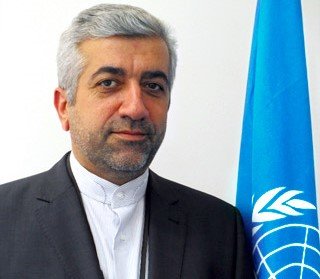Enhancing water efficiency atop agenda: energy minister nominee

TEHRAN — Enhancing water efficiency is high on agenda, Reza Ardakanian, energy minister nominee told IRNA in an interview published on Friday.
Enhancing water efficiency particularly in agriculture sector, waste water reclamation and in general making efficient use of water as priority would straighten the problems out, Ardakanian noted.
The government is responsible for supplying potable water for cities and towns, Ardakanian said, adding, “In cities affected by water stress we have to first decide the causes of water shortage.”
He warned that resorting to quick solutions such as transferring water regardless of the main causes of water shortage would not only resolve the issue but also exacerbate it in short run. “In that case even transferring water would not do any good to clear things up. “
“Transferring the water would not necessarily sort things out, likewise not transferring the water at all is not the answer.” “We need to reconsider water management policies scrupulously and ask ourselves how we use water, how the agriculture sector is developing and what farming methods we are applying into practice.”
Covering shortfalls in water, electricity sectors
Budget deficit is one of the issues the Energy Ministry is struggling with. As Ardakanian has mentioned there exist some 717 incomplete water and wastewater projects with budget shortfalls as high as 1.6 quadrillion rials (nearly $40 billion). In electricity sector, he said, the ministry is burdened with debts stand at 540 trillion rials (nearly $13.5 billion).
The numbers are pretty large and with 485 trillion rials (nearly $12 billion) for new projects will get even larger, he noted.
Ardakanian further pointed out to his comprehensive plans to address the aforesaid shortfalls in water and electricity sectors by exporting electricity, managing the expenses and controlling the expenditure, reforming tariffs and energy pricings within the framework of the sixth five-year development plan, boosting efficiency and using the current rules and regulation in favor of the energy sector.
“Of course raising fund from private sector and attracting cross-border investment are also on agenda,” he highlighted.
Providing water right of the wetlands a key strategy
Providing the wetlands, rivers, and lakes with their water right is a key strategy in sustainable development, Ardakanian said.
“To do so we first need to carefully assess the current status of such ecosystems in association with the Department of Environment, speed the current restoration process and revise some measures if need be,” he explained.
He went on to say that Lake Urmia’s fate must teach us precious lessons to protect other ecosystems from degradation. “Carelessness and negligence amidst development would incur great losses, learning lessons from those losses can soothe things away to some extent, otherwise next time the losses would be much greater and impossible to recover.”
Renewable energies a path to create job opportunities
“[Shifting from fossil fuels to] renewable energies is both on agenda for the government of Iran and is being promoted globally; but we can look at it from another point of view,” Ardakanian noted, “They can be a path to create job opportunities.”
In areas which are forced to give up agriculture [due to water shortage] using renewable energies, such as solar energy, can be proposed as alternative livelihood programs, Ardakanian suggested.
He further said that “installing solar panels on dams’ surface to reduce evaporation rates and increase renewable energy generation is an effective measure we can implement,” but all such decisions depend highly on budget allocation.
After President Hassan Rouhani’s first pick for Energy Minister Habibollah Bitaraf failed to garner a vote of confidence the president nominated Ardakanian for the position. The parliament is scheduled to vote on Ardakanian on October 29.
The proposed energy minister is the Founding Director of UN University’s Institute for Integrated Management of Material Fluxes and of Resources (known as UNU-FLORES).
He has served as Director of the UN-Water Decade Program on Capacity Development hosted by UNU since 2007 and served as Vice-Rector of UNU in Europe from 2009–2011.
He has been on the boards of various international program/organizations such as the UNESCO International Hydrological Program, the UNESCO Institute for Water Education, the International Hydropower Association, and the UNU Institute for Environment and Human Security.
MQ/MG
Leave a Comment